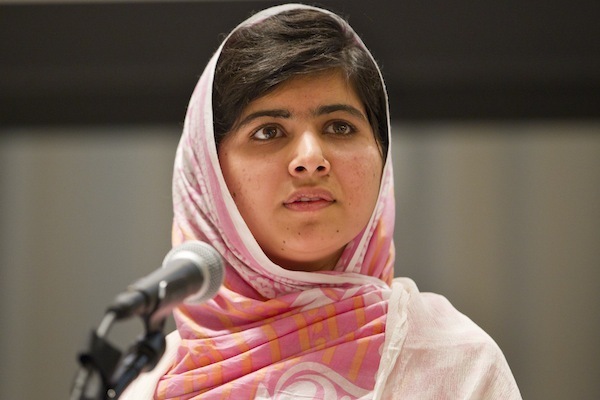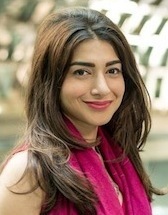Campus community reading ‘I Am Malala’ as semester begins

Malala Yousafzai — whose memoir, “I Am Malala: The Girl Who Stood Up for Education and Was Shot by the Taliban,” will be read in at least 50 courses this fall — speaks at the United Nations last summer.
Photo: UN Photos/Rick Bajornas
Malala Yousafzai became a household name for defying the Taliban and campaigning for girls in Pakistan to have the right to an education. Now readers across the UW–Madison campus, including students in dozens of courses in multiple disciplines, will discover the inspiration behind her mission and the rich and complicated history of her home country.
More than 5,000 students who attended the Chancellor’s Convocation prior to the start of the fall semester received copies of “I Am Malala: The Girl Who Stood Up for Education and Was Shot by the Taliban,” the selection for the sixth year of Go Big Read, the university’s common-reading program. This year, organizers encouraged the campus community to suggest titles that fit into a theme of service.
UW-Madison Chancellor Rebecca Blank, who selected the book from a list of finalists culled from more than 200 titles, says Yousafzai turned the attack into an opportunity to share her vision for a better world in which no child is denied the opportunity of an education.
“Malala’s story is about the value of doing something — anything, even when it’s scary and even when you’re not sure it’s the exact right solution — rather than sitting around feeling hopeless,” Blank told students at the convocation. “And it’s about the power each one of us holds to make good things happen for ourselves and for those around us.”
The memoir by the 17-year-old Pakistani activist, co-written with British journalist Christina Lamb, begins with the moment she was shot in the head in October 2012 on her way home from school in Pakistan’s Swat Valley. The rest of the book retraces the events that led up to that moment in a region that is one of the world’s hot spots.
For Sarah Meinen Jedd, associate course director for Communication Arts 100, Yousafzai’s role as a public speaker made her book a natural addition to the syllabus. The public speaking course’s 59 sections are made up of mostly freshmen students.
“The author’s age makes it easy for students to relate to her, and the compelling tone of the book will draw readers in from the very first page,” she says.
Instructors for the course will supplement the book by having students read some of Yousafzai’s speeches, Jedd says. Students will also watch her July 2013 address to the United Nations and attend the keynote speech on campus in October by Shiza Shahid, CEO co-founder of the Malala Fund, which supports local entrepreneurs who have developed programs to increase educational access for women.
“It is wonderful for students to have the opportunity to see speakers in action, especially in large venues,” Jedd says. “I wish I could be a fly on the wall in all 59 discussion sections the next day to hear their lively analysis of the speech.”

Shiza Shahid
Shahid’s visit to campus will include her public talk on Oct. 27 at 7 p.m. at Varsity Hall in Union South. The event is free and no tickets are required.
During fall semester, the book will be included in at least 50 courses in disciplines including anthropology, English, environmental studies and nursing. Students enrolled in those courses will receive free copies of the book.
“I always use the Go Big Read book in my own upper-level criticism classes, and I love seeing students engage with each other and with people throughout the community about the issues generated by the books,” Jedd says. “It’s like a giant book club, and I really enjoy helping students become a part of the conversation.”
Another group of students who will be discussing the book are participants in interfaith student forums organized each year by the UW’s Lubar Institute for the Study of the Abrahamic Religions, established to promote mutual understanding and civility among Jews, Christians and Muslims after tensions arose following 9/11.
“Malala’s story is about the value of doing something — anything, even when it’s scary and even when you’re not sure it’s the exact right solution.”
Rebecca Blank
Charles Cohen, the institute’s director, says it would be easy to view “I Am Malala” as presenting competing ideas and structures to moralize as either good or bad, such as modernity vs. custom, Western civilization vs. Islam, democracy vs. authoritarianism, and women’s rights vs. hidebound patriarchaism. But that’s too simplistic a reading of the book.
“In narrating Pakistan’s recent history through the lens of autobiography, it also raises questions — about cultural differences, the legitimacy of traditional norms, the role of religion in society, and, even, American policy in the age of 9/11 — whose answers warrant the kind of probing discussion that Go Big Read is designed to engender,” Cohen says.
Many other student and staff book groups across campus are also reading and discussing the memoir. In addition, the Madison Public Library — which partners with the Go Big Read program each year — and public libraries around Dane County are hosting book discussions during September, October and November.
Tags: Go Big Read, students
